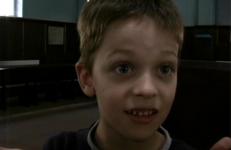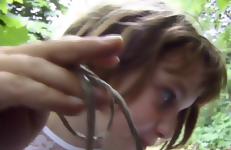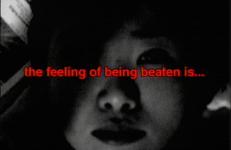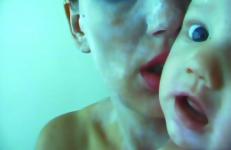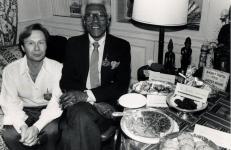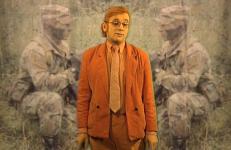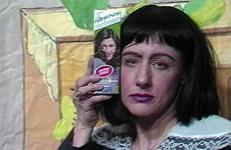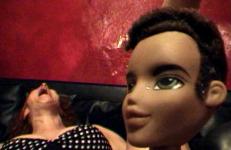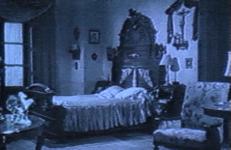A video diary about Cuthand's efforts to undergo artificial insemination. Cuthand contemplates a desire to have children and its relation to preserving Indigenous culture.
Family
In Dani Leventhal's video, 17 New Dam Rd., we are invited along on a house visit with a familial group. There's trash in the garden, guns on the sofa, and marshall arts in the living room. A photo session records a young woman throwing punches at a man, playacting for the camera, but sweating anyway. A kitten ignores the bullets littered on the ground. Despite the foregrounding of violent pursuits, lost teeth and pool hall fights, there's a rough camaraderie here, a feeling of loyalty and belonging.
Subtitled "The Refusenik", "The Zealot", and "The Father", this video takes us on a journey where Germans, Turks, Israelis, Palestinians, fathers, grandmothers, daughters and animals are together for 13 minutes.
37 Stories About Leaving Home provides a rare and personal view into the lives of Japanese women. This beautifully constructed and complex video weaves stories told by a group of Japanese grandmothers, mothers and daughters, ranging in age from 15 to 83. The stories recount each woman’s personal journey from child to adulthood—their experiences of leaving home.
In 50 Blue a young man (the artist’s brother) pushes an elderly disabled man (the artist’s father) in a wheel chair through a muddy landscape. It is a long and exhausting trip to an unknown destination only discovered at the end. After an arduous struggle the two arrive at the edge of a grey lake where a 10-meter high guard tower stands. The young man ties the wheel chair to a rope and hoists the old man up on the tower platform with the help of eight men, all dressed in yellow plastic raincoats.
"Inside a Lithuanian synagogue, young Domas Darguzs regales the filmmaker with a whispered, wide-eyed account of mythical events, while the film cross-cuts to images of farm-life. Kid brother of an Israeli soldier, Domas's stories are part fantasy, part hopeful ruminations of a courageous, young mind interrupted only by an impatient adult."
— KJ Mohr
In the aftermath of a death things may seem very quiet, but there are struggles going on so deep not even those who struggle can recognize them. This film looks and listens for signs of those struggles. Psychoanalytic interjections consider the nature of time and rumination, and are used to step outside of the terribly interiorized state of mourning.
-- Jennifer Montgomery
The “a-ha experience” is the moment when a child first recognizes its own image in a mirror; it is critical to the development of intelligence and identity. It is also the moment when the “self” is surrendered to the control of an external influence. The child accepts the power of the mother to confer or withhold love; it is the mother’s power to fulfill desire that shapes a child’s sense of identity. Similarly, a camera controls love by directing or not directing its attention to the desiring subject.
All About A Girl is a story of a girl coming to terms with aspects of her own identity and how they relate to the expectations of others. The girl tries to balance the real world that she lives in with the world of her imagination as personified by a dead rat. She appears to have more in common with her small, wild corner of the backyard than the pristine world her mother creates around her.
Annie Lloyd is a daughter's poetic documentation of the last few years of her mother's life and an intimate portrayal of the creativity and wisdom of old age.
This title is also available on Cecelia Condit Videoworks: Volume 2
Another Clapping explores the relationship triangle between a daughter, her mother and the Chinese Cultural Revolution. It is an experimental documentary based on the mother's violent past with its traumatic political history and an unsuccessful marriage. Through their subsequent experiences as immigrants in Canada and the complex process of remembering and reviewing the past, history comes to signify the characteristic of the individual. The tracing of memory illuminates the difficulties of identifying mother and daughter as different people.
A 12-year-old Olympic swimmer and her mother (both played by July) speak to the public about going for the gold.
“As the film progresses through subtle editing-in-reverse, July reveals the world around the televised facade. ... [T]he 23-year-old performer convincingly plays both Dawn Schnavel and her mom, or rather, vanishes into them. What’s noticeable isn’t so much the ease with which July transforms herself into a pre-teen girl and an older woman but the similarities and differences between the daughter and the mother July becomes.”
In the late 1970s, Walter Naegle was walking to Times Square to buy a newspaper when he ran into a striking older African American man on the corner. Walter says that “lightning struck” and his life changed forever at that moment. The man on the corner was Bayard Rustin.
Because of the War things were changing. Very few toys or games were left and music was almost over. Tap water was tasting female and television only came in nasty spasms…
A surreal and sometimes comic meditation on how war affects the hopes and dreams of ordinary people.
"An autobiographical reflection on his unassuming name leads the filmmaker down a wayward path through family photographs, personal archives, and internet searches.
Small-town friends watch fuzzy TV, play music, and venture to the video store. Mom bakes a cobbler. The filmmaker fucks his boyfriend in the bedroom above the kitchen.
This strange, lyrical performance video diary is a millennial reflection on the impossibility to "reveal" one’s self in stormy times such as ours. The piece is also about the intricate connections between performance and everyday life; about language, identity, love, nostalgia and activism amidst the California apocalypse.
Martha Rosler tackles mainstream media's representation of the case of surrogate mother Mary Beth Whitehead.
Take a peek at scenes extracted from a videomaker's life. See him amid the glittering domain of glamour being given an award for his work visual work. Meet some of his family, including the "furry ones" – (his cats and rainbow coated dog), and stroll along with him into the deep woods at twilight.
A metropolis awash in electrical overdrive crashes in the heat of summer and sends a Bronxite into the clutches of a waterworld further north. It is there that we witness the cooling fogs and diving mammals of maritime yore and sail free in winds of a nautical nature. A nature that fills the summer sky with twinkling tidbits and the tummy with protein rich denizens of Neptune’s soup. A tour of the towering turrets of tomorrow land and the spatial splendor of yesterday’s yearnings captured on both chemical and electrical media.
The Bus Stops Here is an experimental narrative about two sisters, Judith and Anna, plunged into depression by their struggle to gain control over their lives. Narrated by Judith’s counselor, The Bus Stops Here traps these women in a narrative in which their unmediated voices are rarely heard; instead, the viewer learns about them only through the interceding power structures of narrative, family, and psychiatric establishment.
"The life of objects intrigues me. Apparently inanimate, they adopt the souls, actions and lifestyles of their keepers. Here, a bed testifies to what goes on behind the closed door of a decent family's bedroom."
—Ximena Cuevas
A family embraces the heart of evil in this Poltergeist re-make/drag show, circa 1992.
As a testament to the Videofreex joyful investment in the medium of video, Skip Blumberg, Bart Friedman, and Nancy Cain take turns singing Christmas carols in the shower on Christmas Day. Audible from a range of proximity—from the end of the long hallway to the intimate space behind the shower curtain—the Videofreex entertain one another with rousing renditions of ‘Oh Holy Night’ and ‘Santa Claus is Coming to Town,’ while playfully experimenting with the potential that the visual properties of condensation and steam, and bathroom acoustics offer up for video recording.









